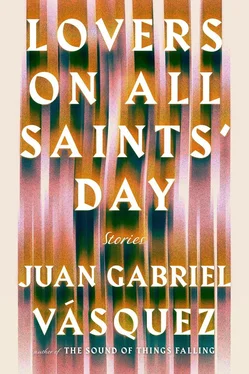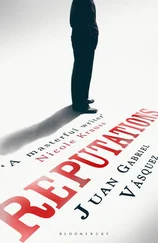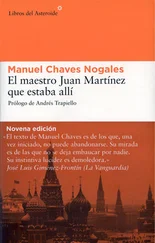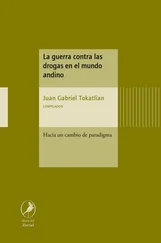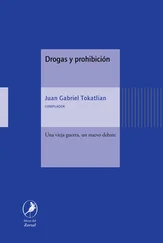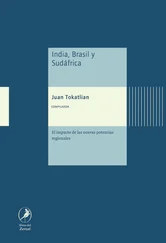He began to try to free it from the lure, but the hooks had pierced its cheek and impaled its brown tongue. The blood spread over the silver-plated lure and Gibert’s pale fingers. The trout shook, fell to the ground, Gibert squeezed it in his hands again to try to free it, and said keep still, connasse , I’m trying to help you. The tongue was bleeding, the lure was stuck in it like an anchor, and I was imagining the intensity of the pain and the miracle of features — eyes, a mouth — in which pain is invisible. I don’t usually fish, and maybe that’s why I found myself imagining that a knife was going through my tongue, and I would have sworn I felt a surge of pain in my jaw. Little idiot, said Gibert. His thumbnail turned a watery red.
“Trop tard,” said Gibert. “Too late, filthy creature.”
He walked over to the beech logs with the fish still bending in his closed fist, gasping laboriously like an asthmatic. Then Gibert raised his arm and banged down hard against the edge of a stump, and the trout’s skull made a flat sound as it hit the bark. Gibert hit it three times, very quickly, and the unechoed crunch of broken bones was clear in the air. The bark of the stump was smeared with scales and blood. The trout, one eye burst and covered in splinters, stopped thrashing.
—
I SPENT THE AFTERNOON in the Waterstones bookshop near the Bourse, across the street from a peep show. I found a couple of books about the Paris bookshop I was going to visit. They mentioned George Whitman, the owner, and one of them mistakenly said this was the bookshop that had published Ulysses in 1922. The other, more useful, said that Whitman (who was not related to the poet, it emphasized) had arrived from California and founded three bookshops before the one that I would visit. It was a small book, almost a pamphlet; I thought I’d read it in the hour and a quarter the train journey from Brussels to Paris took. Then I looked at my watch, left in a hurry, and walked as quickly as the cold, biting February air would let me.
Claire’s studio was on Rue Braemt, a street of immigrants in which every second or third building had a Turkish restaurant or a secondhand clothing shop on the ground floor. It was already dark, and only the polished gleam of the neon lights from the shops lit up the quiet street. As I turned the corner, I saw a silhouette in front of the workshop. I had to get very close, almost right in front of her, before recognizing an impatient Claire, who was waiting for me. Or maybe, I thought, it wasn’t me she was waiting for.
Her hair was stuck to her temples, as if she’d been sweating. She told me she’d just had a call from Philippe, and after hanging up the phone, she’d cupped her hands under the tap at the workshop sink and splashed her face, as if trying to wake up.
“It’s his nephew,” she said. “He’s been in an accident.”
Philippe had only one nephew: his sister’s son was an eight-year-old with green eyes who looked nothing like her, but a lot like his father. The only time I met him he confessed that he hated the Flemish language and was never going to learn it.
“What happened?” I asked. “Is it serious?”
“We don’t know anything. Go on up, wait for me upstairs. He’s on his way here, and I don’t think he’d like you to see him right now.”
A little kid in baggy trousers went past on a skateboard. Claire didn’t even notice him.
“This can’t be happening to him,” she said. “Not him, not now.”
“But Philippe’s coming here?”
“Yeah. He won’t want you to see him in such a state. Go on up, go, I’ll be there in a bit. Poor thing, he’s a rotten mess.”
The door to her studio was ajar, as she’d obviously rushed out. I thought I caught a whiff of bad eggs, but it might also have been an oil fixative I wasn’t familiar with. I thought about the smell and about the word Claire had used, rotten , a word barely applicable to a living man. Four neon tubes hung from the high ceiling. On top of a little electric stove, the food Claire was preparing still steamed: stuffed peppers. I took off the lid and the fragrance of the spices mingled with the chemical smell of the fixative and paints. While I waited for Claire, I thought, I could have a look at her canvases. Then I thought she would like to guide me through the paintings when I saw them for the first time, and looking at them without her would be a minor betrayal; so I stretched out on a camp bed covered in wool blankets and picked up a Giacometti book. I couldn’t concentrate (part of my attention was trying to hear any sound coming from the street or the ground floor, a crying man, a consoling woman), but I found an old catalog between the pages: in it, Giacometti was asked why the feet of his figures were so big, and he said: I’ve always had the impression or sense of the fragility of living beings, as if each moment required an arduous energy to remain upright. The words struck me as opportunistic and emphatic, an artist’s pose. I was involved in these ridiculous imaginings when Claire arrived.
“They don’t know anything. And he’s very confused. The boy was out for a drive with a couple of friends and the father of one of them. Nothing happened to any of them. Just him.”
“But what happened?” I asked.
“They were on the highway. Or not, maybe that’s what Philippe thinks. But maybe they were on a mountain road. Why him?”
“Who?”
She looked up and the neon was like powder on her nose. “What do you mean, who?” she whispered, and I realized we were on the brink of a serious misunderstanding. I wanted to say there was an injured child and saying Why him? could refer to Philippe but also to the boy. Then I understood I could not speak those words.
“Nothing,” I said. “Never mind.”
“Poor Philippe, his poor family. I swear, they have such bad luck, it’s as if they’re cursed.”
The intercom buzzed just then. Claire lifted the receiver, said hello to someone with sudden politeness. “Come on up,” she said, and pressed a button with an image of a key on it.
“They’re here. Shit, now I don’t know if I want to see them.”
“Tell them what happened.”
“It’s too late. They’ve come all this way. They live really far away, I asked them to come and they came….”
“Whatever you say. Can I ask you something?”
Claire opened the door. From downstairs came the voices of her friends who were on their way up.
“Why didn’t you go with him?”
“Because he didn’t want me to go with him. Because he’s always wanted to protect me.”
And then she added: “At least, that’s what he tells me.” The voices on the stairs kept approaching. I asked her what she meant by that, if she didn’t believe Philippe’s reasons. It was as if she were choking on a marble.
“It’s possible he doesn’t do it to protect me,” she said. “In his family terrible things have happened, if only you knew, it’s as if nothing comes out right for them. But maybe, just maybe, he does it to look out for himself. To get home at night, having seen his sister or his father or whoever, and feel that he’s entered another world, that he’s safe. I don’t know, ‘cursed’ is a strong word, I feel horrible saying it. But there is something he’d like to hide from. If he takes me to these things, if he lets me go with him and I get soaked in that pain, what hiding place remains for him?”
—
AT ABOUT TEN we walked back to Claire’s house. The wind had dropped and the streetlights cast shadows of bare branches. We skirted a park and a basketball court. I noticed that the hoops didn’t have nets and then I saw the nets piled up on the concrete bleachers. Claire was carrying her phone in her hand, not in a pocket or in her bag, but prepared for it to ring as if urgently answering Philippe’s call would alleviate the gravity of events or prevent their consequences. The women she shared her studio with hadn’t picked up on anything; we’d discussed Claire’s paintings, those pregnant wombs and cartilages and lungs that she was able to bring to life on the canvas. We ate stuffed peppers, and one of her friends (maybe Vera, the one with short hair and a bullfighter’s pigtail) pointed out that they resembled the saffron-colored lungs of the paintings. Claire said yes, maybe, that one never knows where shapes and colors come from. But her head was elsewhere, and I was starting to understand that much more than a child’s life was at stake: for Claire, something immense and something of her own was at risk that night, as if she’d placed a bet, as if her happiness or ruin depended on a call about another person’s fate.
Читать дальше
